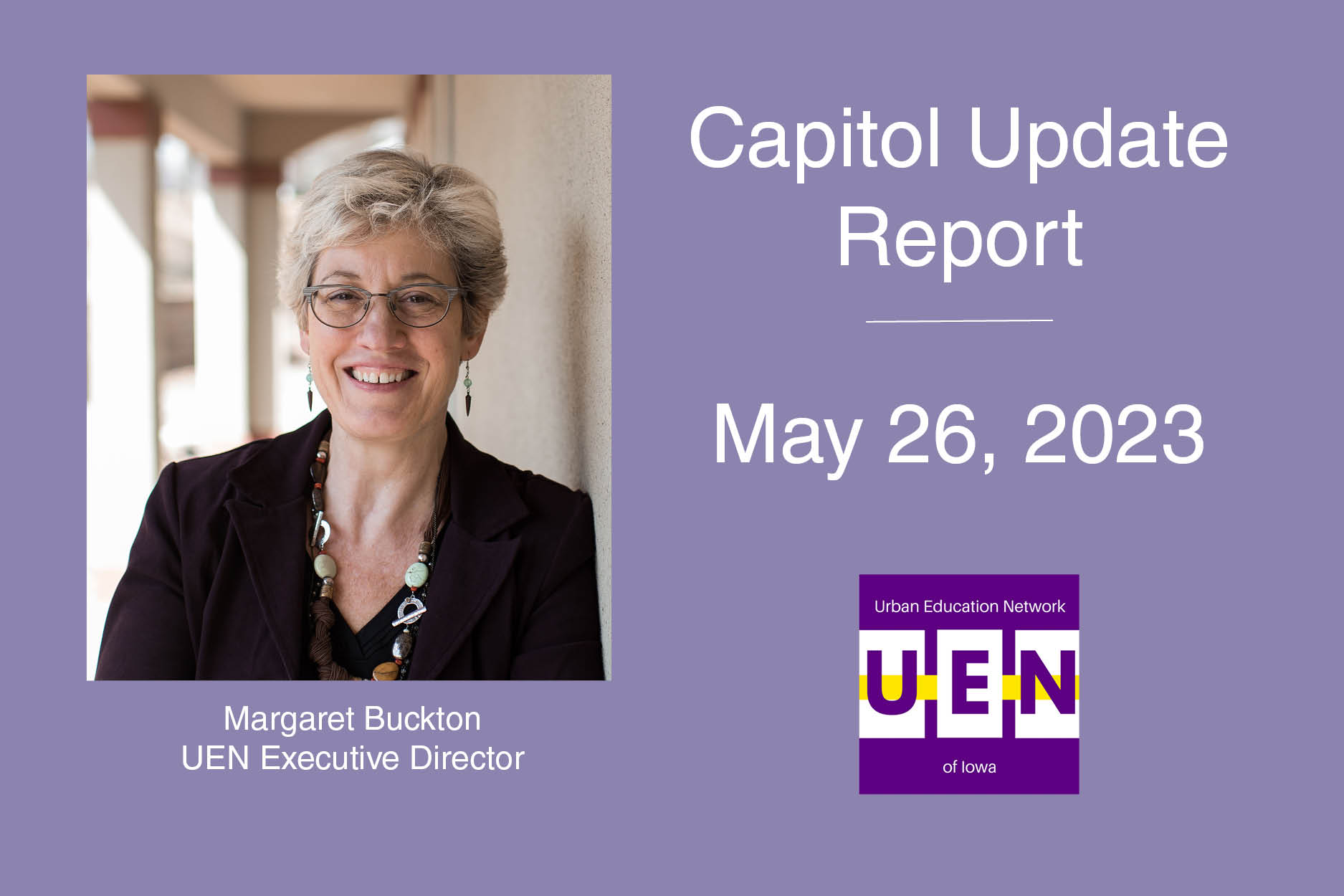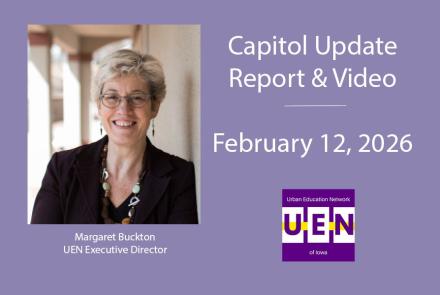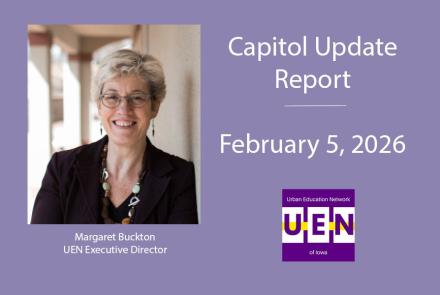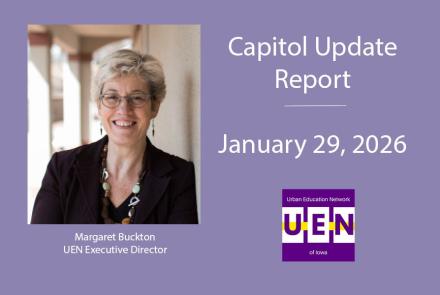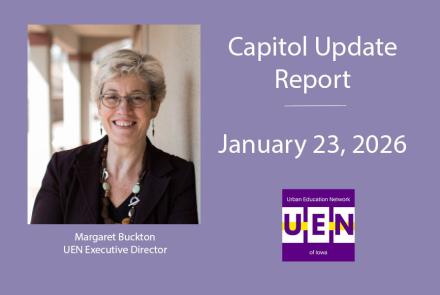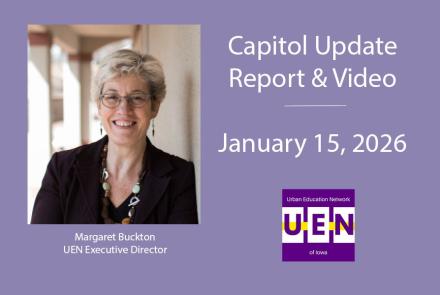Capitol Update - May 26, 2023
UEN Legislative Update
May 26, 2023
Download the Printer-Friendly May 26, 2023 Legislative Update
This UEN Legislative Update includes:
- Session Limbo: Waiting for Next Steps
- Timelines for Implementation
- Policy and Procedure Mandate Tracker from the 2023 Session
- Status of Bills Signed and Awaiting Signature
Session Limbo: Waiting for Next Steps
At the end of every legislative Session, there is a waiting period of 30 days, during which bills that were approved by both the House and Senate are enrolled, signed by the President of the Senate and the Speaker of the House, and sent to the Governor. She and her staff also review the final copies of all enrolled bills and determine whether she will sign or veto (or line-item veto any single item in an appropriations bill). The 30-day deadline is June 3.
Until bills are signed, they are not law. Once they are signed, laws typically become law at the start of the new fiscal year, (July 1), however, some have other enactment or enforcement dates. Many of the bills enacted this year have varying implementation and enforcement dates, some of which will follow administrative rules developed by the State Board of Education or the BOEE (this process alone typically takes 180 days.) DE might also issue some guidance to school districts regarding the executive branch’s interpretation of what the laws require. There will be some sample school board policies developed and procedures identified.
This job is big for one large policy change, but this year, there are several big policy changes which will require much work on the part of the DE and others, so all of this information may not be available soon. So please consider all of this when proceeding to implement – don’t get the cart before the horse or you may have to reverse course.
Timelines for Implementation
There are several significant policy bills this year, including SF 496 Parents’ Rights/Transparency, HF 604 Discipline and Removal from the Classroom, SF 391 Chapter 12 Flexibility, SF 482 Bathroom Use by Gender, and HF 68 Education Savings Accounts, that require time, attention and interpretation by the State Board of Education and the DE.
The DE is also complying with Gov. Reynolds Executive Order #10 to review all administrative rules, which will require significant staff time at the Department and should include opportunities for stakeholders to provide feedback. Only a few of the bills, such as HF 68 Education Savings Accounts and SF 482 Bathroom Use by Gender, are already effective. Stay tuned to your email inbox for more information throughout the Summer and likely into Fall as details become available.
Policy and Procedure Mandate Tracker
ISFIS has prepared a document to track all of the mandates in bills enacted this year (and cautionary reminder, as of this writing, they are not yet all signed by the Governor). We will update this document and share any changes as we learn more, but it will hopefully serve as a good reminder of the policy implementation steps that are required in the many policy changes approved in the 2023 Legislative Session. Find the Link to Tracker Here.
UEN Bill Status as of 5/22/2023
Below is a list of bills enrolled and sent to the Governor, followed by a list of dead bills UEN was tracking. Page down to see detailed bill descriptions of all the bills sent to the Governor.
- HF 68 Education Savings Accounts/School Choice - Signed 1/24/2023
- HF 143 Ransomware Prohibited - Signed 5/11/2023
- HF 256 Minimum Age of BOEE Licensure - Signed 5/3/2023
- HF 430 Mandatory Reporter and BOEE Makeup
- HF 602 Suicide prevention info on school ID cards
- HF 604 Discipline and Removal from Classrooms
- HF 614 BOEE Licensure for individuals from Other State/Nations
- HF 672 MA+ Permanent Teacher Licensure
- HF 707 Childcare Assistance Reform – Signed 5/28/2023
- HF 718 Property Tax Reform - Signed 5/4/2023
- SF 157 Drivers Ed Final Field Test Authorization - Signed 3/22/2023
- SF 181 Property Tax Valuation Error Correction - Signed 2/20/2023
- SF 192 3% SSA Signed 2/07/2023
- SF 250 Computer Science PD Disbursements - Signed 5/3/2023
- SF 318 Office of Apprenticeship - Signed 5/10/2023
- SF 391 Chapter 12 Flexibility
- SF 482 Use of Bathroom by Gender - Signed 3/22/2023
- SF 496 Transparency and Parents’ Rights
- SF 514 State Government Reorganization - Signed 4/04/2023
- SF 560 Education Appropriations
- SF 578 Standings Appropriations
Bills that Died
- SF 246 Dropout Prevention Equity. UEN registered in support.
- SF 251 Administration Expenditure Limitation. UEN opposed.
- SF 253 Mental Health Professional Loan Repayment Program. UEN registered in support.
- SF 392 Teacher Recruitment/Retention Omnibus including management fund for recruiting/retention plans. UEN registered in support.
- SF 393 Interim School Finance Committee in 2023. UEN registered in support.
- SF 483/HF 608 Seizure Disorder Training. UEN opposed.
- SF 485 Open Enrollment Busing. UEN opposed.
- SF 543 Guns on School Grounds. UEN opposed.
- SF 572 Clean-up and Tax Credit Changes to ESAs. UEN registered in support.
- HF 297 PK Weighting 1.0 for low income. UEN registered in support.
- HF 370 IASB Updates (Health Trainings Tax Force, Bonding, etc.) UEN registered in support.
- HF 459 Operational Sharing Weighting and Cap. UEN registered as undecided.
- HF 477 Poverty Work Group. UEN registered in support.
Enrolled Bill Descriptions
HF 68 Education Savings Accounts/School Choice was approved in the House, 55:45. Republican Representatives Bergan, Best, Bloomingdale, Ingels, Lohse, G. Mohr, T. Moore, Sieck, and Siegrist voted no along with all House Democrats. Republican Senators Evans, McClintock, and Shipley joined the Senate Democrats in voting no, with the final Senate vote 31:18. Governor Reynolds signed it on Jan. 24, 2023. The bill includes:
- ESAs equal to the State Cost per Pupil to pay tuition and fees to accredited private schools and other expenses ($7,598 based on the Governor’s 2.5% SSA recommendation.)
- Fund controlled by DE sets up the ESAs and allows a contract with a 3rd-party provider to manage the fund (application, eligibility, accounts, audits, and fraud prevention). If a parent commits fraud, DE is to recover funds and the parent is prohibited from participating.
- Allows unspent ESA money to be retained until graduation or age 20, whichever happens first. (Note: SF 572, if enacted, would require transfer of remaining funds back to the state if a student withdraws, is expelled or does not reenroll in an accredited nonpublic school in a subsequent year.)
- Excludes the scholarships from income taxes (retroactive to Jan. 1, 2023).
- Requires recipients of an ESA to be tested by mandated state and federal assessments. The assessments for state and federal compliance posted on DE’s web wage include: ISASP, DLM, ELPA21, ELPA 21 Screener. PK GOLD (doesn’t apply, no ESAs for preschool), Early Literacy Universal Screener and Progress Monitor, ELAA for IEP Students, Diagnostic Lit Assessment, End-of-unit assessment for students taking ½ unit U.S. Government
- Eligibility: Student must be enrolled in an accredited private school to apply for ESA before June 30. Students in homeschool settings do not qualify for an ESA in this legislation unless they enroll in a private accredited school. ESAs will be available based on the following eligibility:
Year 1: School Year 2023-24
-
-
- All entering kindergarten students
- All students not enrolled in a private school for the prior two semesters (could be either homeschool, from a public school, or potentially new to the state).
- A student enrolled in a private school with a household income at or below 300% of the federal poverty line, $83,250 for a family of four.
-
Year 2: School Year 2024-25
-
-
- All entering kindergarten students
-
- All students not enrolled in a private school for the prior two semesters
-
- A student enrolled in a private school with a household income at or below 400% of the federal poverty line, $111,000 for a family of four.
- A prior year recipient of an ESA
- All entering kindergarten students
-
Year 3: School Year 2025-26
-
-
- All K-12 students in Iowa, regardless of income
-
- Categorical Funds: includes students receiving an ESA who are residents of a public school in the enrollment count for categorical funding purposes, an average of $1,205 per student, for TSS, PD, EICS, and TLC. The exact amount will be determined by the district’s aid and levy worksheet per pupil amounts. Such students will first be counted Oct. 1, 2023, with funds first available in the budget beginning July 1, 2024. This includes all ESA recipients, even if they have never attended the public school.
- Qualified educational expenses: includes tuition and fees at a nonpublic school, textbooks, fees or payments for educational therapies, including tutoring or cognitive skills training, curriculum fees, software, and materials for a course of study for a specific subject matter or grade level, tuition or fees for nonpublic online education programs, tuition for vocational and life skills education approved by the department of education, education materials and services for pupils with disabilities from an accredited provider, including the cost of paraprofessionals and assistants who are trained in accordance with state law, standardized test fees, and advanced placement examinations or examinations related to postsecondary education admission or credentialing. Qualified educational expenses are limited to these items and rules adopted by DE to implement this section. Expenses made from the ESA are prohibited from including transportation costs for the pupil, the cost of food or refreshments consumed by the pupil, the cost of clothing for the pupil, or the cost of disposable materials, including but not limited to paper, notebooks, pencils, pens, and art supplies. Private school expenditures are not audited and likely could be used for transportation or any of these other items once tuition is paid to the private school.
- Private School Authority: Private school is not under any additional regulation. No required change in academic or enrollment requirements. Private school is to be given maximum freedom to meet the needs of students. No regulation on expenditures once the private school receives tuition and fees. No prohibition to raising tuition. The only requirement is state and federal assessments given to students with an ESA (eventually all who apply) see above.
- Compliance requirements Chapter 284: Requires any TSS distributions to follow Chapter 284 provisions (TQ Committee, etc.), however, allows relief from the TLC mandates in Chapter 284 if used for TSS. DE’s guidance document describes the possibilities. This particular provision looks to be broader relief from the mandates than if the district just uses the funds for TSS:
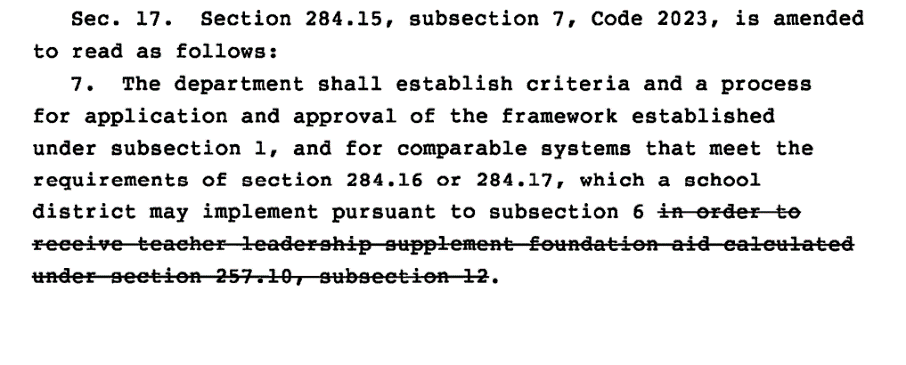
- Flexibility: allows TLC, PD and TAG (Talented and Gifted) ending balances to be used for any TSS purposes. (TLC and PD can both already be used via the flexibility account for any general fund purpose and a few others).
- Operational Sharing: extends Operational Sharing through 2034, but does not change the 21-student cap or repeal the supplementary weighting roll-back (3 student count stays 2 and 5 student count stays 4)
- Appropriation: sets a standing, unlimited appropriation equal to the amount necessary to pay for the ESAs (and beginning July 1, 2024, state aid will include the amount for categorical funds for resident private school students.)
Reflections on the legislative process: The process was so shortened by procedural exceptions (committees of the whole rather than subcommittee meetings, allowing legislation from the Education Reform Committee to bypass consideration by Appropriations or Ways and Means Committees, and amending big policies on the floor rather than in Committee). The expedited process removed many opportunities for public and lobbying input that would otherwise have occurred.
HF 143 Ransomware Prohibited: This bill prohibits individuals from participating in unauthorized access to computers, known as ransomware. The bill was approved by the House 97:1 and by the Senate 50:0 and the Governor signed it on 5/11/2023. Prohibits a person from:
• Access, attempt to access, cause to be accessed, or exceed the person’s authorized access to all or a part of a computer network, computer control language, computer, computer software, computer system, or computer database.
• Copy, attempt to copy, possess, or attempt to possess the contents of all or part of a computer database accessed as described above. A person is prohibited from committing the acts listed above with the following intent:
• To cause the malfunction or interruption of the operation of all or any part of a computer, computer network, computer control language, computer software, computer system, computer service, or computer data.
• To alter, damage, or destroy all or any part of data or a computer program stored, maintained, or produced by a computer, computer network, computer software, computer system, computer service, or computer database.
A person is prohibited from intentionally, willfully, and without authorization engaging in the following activities:
• Possess, identify, or attempt to identify a valid computer access code.
• Publicize or distribute a valid computer access code to an unauthorized person. A person is prohibited from committing an act prohibited by the Bill with the intent to interrupt or impact the functioning of various entities, as listed in the Bill. The Bill creates an exception for the use of ransomware for research purposes. However, a person is prohibited from knowingly possessing ransomware with the intent to introduce it into the computer, computer network, or computer system of another person without the authorization of the owner. A violation of the provisions of the Bill is punishable as follows:
• A violation that causes pecuniary losses involving less than $10,000 to the victim is an aggravated misdemeanor.
• A violation that causes pecuniary losses involving at least $10,000 but less than $50,000 to the victim is a Class D felony. Fiscal Note Fiscal Services Division 2
• A violation that causes pecuniary losses involving at least $50,000 to the victim is a Class C felony.
The Bill also permits a person injured by a violation of the Bill to bring a civil action. UEN was registered in support.
HF 256 Educator License Minimum Age: the bill allows the Board of Educational Examiners to issue a teaching license or substitute license to an individual at least 18 years of age, as long as the individual has completed all necessary degrees and certification requirements for the license or certificate. It also applies to paraeducators. The House passed the bill 95:0, Senate agreed 49:0. Signed by the Governor 5/03/2023. UEN was registered in support.
HF 430 Mandatory Reporter and BOEE Board Make-up: establishes a process for investigations of employee conduct, hiring practices and changes membership of the Board of Education Examiners, including the follow provisions:
- Requires school employees to be mandatory reporters for children of all ages and applies to all employees over age 18. (includes charter schools)
- Requires DE to develop and implement a process for reporting and investigating an employee’s commission of a felony or violation of IC 272.15 (1) “a” regarding inappropriate relationship or contact with a student. Requires this process to:
- Prohibit written or oral agreements between school districts and employees which prohibits the employer from discussing any employee behavior or incidents with officials or prospective employers as a condition of resigning.
- Prohibit a written or oral agreement that waives liability of a licensed employee related to or arising from an incidents, past performance, action or allegations of wrongdoing.
- Requires district to provide all documentation and info related to the incident to BOEE for investigation if the employee resigns or contract is terminated.
- Requires districts to complete an investigation for unlicensed employees no longer working for the district.
- Requires the district to review an applicant’s employment history, including contacting the applicant’s previous employers listed on the application for employment and by viewing the BOEE’s public license information to determine if there is a case pending with a finding of probable cause or any licensure sanction.
- Requires district to keep information on forms prescribed by DE and respond to any request from a potential employer (but not required to reveal information about unfounded, closed investigations. Gives school leaders immunity from criminal or civil liability arising from disclosure as long as the information is not knowingly false.
- Requires BOEE to conduct a hearing if a licensed employee fails to follow this process or intentionally conceals information from any governmental agent, officer or potential employer.
- Requires an annual report by BOEE to the General Assembly with the number and types of disciplinary hearings, trends, investigations related to administrators reporting of incidents or following this process.
- Requires BOEE to finalize an investigation even if the practitioner resigns or surrenders their license.
- Requires BOEE to adopt rules that:
- require collection and retention of written complaints. If complaint is unfounded, requires all records associated with it be kept confidential.
- notify the public if an ongoing investigation has a case pending with a finding of probable cause. (BOEE is not required to disclose unfounded, closed investigations.)
- evaluate unfounded complaints if similar complaints are filed against the same practitioner.
- require BOEE to investigate an administrator of a school that employs a licensed practitioner subject to investigation involving reporting of an employee incident, requiring the board to investigate whether the administrator failed to file a required written complaint or report to the BOEE.
- BOEE Membership is increased to 13 members:
- four are members of the general public with an interest in education but not a license, and two of the four are parents and one of those two shall have been or is a school board member,
- eight members are licensed practitioners. three of these must be administrators and one must be from a nonpublic school. Remaining four are selected from among elementary or secondary teachers, special education teachers, counselors/special purpose practitioners, school service personnel.
- one member shall be the DE director or designee.
- Additional language specifies terms, quorum and other necessary conforming changes.
The bill was amended and passed the Senate, 48:0, was approved in the House 92:1, and is awaiting the governor’s signature. UEN was opposed to the original bill, but with the passage of the Senate amendment, is now registered in support.
HF 602 Suicide Hotline: requires school districts to publish the phone number and website of a suicide hotline on Student ID Cards for grades 7-12 and may include them on ID cards for students in grades 5-6. Allows but does not require districts to use up existing card stock before being required to include the information. The Senate passed the bill 48:0, the House concurred 94:1, sending it to the Governor. UEN is registered in support.
HF 604 Student Discipline Policies:
- Requires DE to produce a list of code/rule references for all required professional development (PD) and training. Requires schools districts to notify staff of the state/federal requirement for the PD (including Chapter 284 Teacher Quality).
- Requires district to give copy of Iowa Code 280.21 (Corporal Punishment) to teachers with an initial contract and annually with contract renewal.
- Requires the student handbook provided annually to parents of students including the discipline policy. Requires the parent to acknowledge receipt of the handbook, either in writing or electronically.
- Requires the state Ombudsman to investigate a complaint by a BOEE licensed individual related to violence in the classroom, including retaliation regarding reporting. The Ombudsman must provide a report to DE & BOEE and keep the complainants’ identity secret.
- Requires classroom teachers to report threats or incidents of violence resulting in injury, property damage or assault by enrolled students to either the principal or a lead administrator within 24 hours. Allows the teacher to notify the parent of the offending student or the parent of a student threatened or injured. Requires principal/lead administrator to notify parents, of both offending student and student threatened or injured, within 24 hours after the classroom teacher reports the incident.
- Prohibits retaliation for disclosing information to any public official or law enforcement agency, including Ombudsman, if the employee/contractor reasonably believes the information evidences a violation of law, rule, mismanagement, gross abuse of funds, abuse of authority, or substantial and specific danger to public health or safety. Defines “disciplinary action”.
- Requires school boards to adopt, in collaboration with teachers and administrative staff, policies for different grade levels describing how the district may discipline a student for a threat of violence or causing such an incident. Requires board policy to include the following:
- Strategies designed to correct the student’s behavior.
- Provide for parent conference, counseling or mental health counseling sessions, when appropriate, including prior written parent consent for MH counseling.
- Must be consistent with special education law.
- Provide for escalating levels of discipline.
- Allows the district to select the appropriate level of discipline corresponding to the severity of the incident.
- Allows districts to suspend the student, permanently remove the student from a particular class, expel, or place student in alternative learning environment, including a therapeutic classroom if appropriate and available.
- Requires an IEP meeting if offending student has an IEP.
- Requires the district to publish the policy on the school district’s website.
The bill as amended, was approved in the Senate, 49:0, the House concurred 94:0. The Governor has not yet signed it. UEN was opposed to the bill by the House, but with the Senate amendment, is now registered as undecided.
HF 614 BOEE Out of State Licensing: allows individuals from other states or countries to get an Iowa teaching license if the individual has any of the following: 1) a full license from another state or country that is not temporary or an emergency license, 2) verification from an institution in another state that the applicant completed all program and licensure requirements with the exception of any assessments required by the state and 3) transcripts indication that the applicant completed a teacher preparation program located in another country. The bill was approved by the House 95:0 and the Senate agreed, 49:0. It is awaiting the Governor’s signature. UEN is registered in support.
HF 672 MA+ Permanent Teacher License: allows a permanent license for teachers with masters’ degree or higher and at least 10 years of experience without CEUs contingent on a background check. Applies background check requirements to accredited private schools and requires BOEE to undergo a background check for these permanently licensed individuals every five years. Allows the BOEE to charge an appropriate fee. Still requires evaluator licensure update every 10 years. Approved by the House 98:0, by the Senate 49:0 and sent to the Governor. UEN is registered in support.
HF 707 Childcare Assistance Requirements: establishes work and income requirements for state childcare assistance. Establishes income requirements for initial eligibility for State child care assistance at 155.0% of the federal poverty level (FPL) for a family with children needing basic care, 200.0% of the FPL for a family with children needing special needs care, or 85.0% of the State median gross monthly income. Modifies eligibility requirements for the CCA Program wait list by increasing minimum hours of employment or participation in an approved training or educational program from 28 hours per week to 32 hours per week for a family with children needing basic care and 28 hours a week for families with special needs children. The Senate amended and approved the bill 48-0; House concurred 92:1, sending it to the Governor. UEN did not register on this bill. The Governor signed it May 18, 2023.
HF 718 Property Tax Reform: The House and Senate came to a compromise on property tax reform in the final days of the 2023 Session. The compromise includes the following:
- Changes budget certification for schools from April 15 to April 30.
- Changes budget appeal deadline from April 25 to May 10.
- Prohibits any new Public Education and Recreation Levy (PERL) votes but does not impact those currently in place.
- Creates a Taxpayer Statement that must be mailed to taxpayers and requires a public hearing on that notice. Schools must submit the information to Department of Management (DOM) by March 15.
- Taxpayer statements are provided to county auditors by DOM and required to be mailed to property owners by March 20.
- An additional public hearing must be held prior to adoption of the school district budget (follow normal publication 10 to 20-day window).
- Taxpayers can submit comments at the hearing or in writing.
- Taxing authority can reduce levies at this point, but is prohibited from increasing levies.
- Must provide proof of publication of public hearing notice to county auditor.
- The regular public hearing on the budget must still occur after the taxpayer statement hearing.
- Taxpayer statements are required to include the following:
- Tax levy and tax rate for current fiscal year.
- Effective property tax rate for the subdivision.
- Property tax dollars for the budget year and the tax rate.
- If the budget year amounts are higher, a detailed statement of the major reasons for the increase and the specific program or purpose.
- Example with a residential property of $100,000 value.
- Example of a commercial property of $100,000 value.
- School’s percentage of total property taxes.
- Detailed explanation of reason for increase if greater than last year.
- Date and time of this public hearing.
- Public hearing is required per the date and time published in the taxpayer statement. The public hearing must allow oral and written testimony from residents or property owners. The public hearing must be separate from any other meeting on budget or any other school district purpose.
- Bond issue elections will only be allowed during November elections (includes all Novembers, not just during the school board election).
- Auditor must send not less than 10 nor more than 20 days prior to the bond election, to each registered voter, a notice of election that includes the full text of the public measure to be voted on.
- Establishes a new Homestead tax exemption in addition to the homestead credit for an owner that has attained the age of sixty-five years by January 1 of the assessment year, with the exemption equal to $3,250 additional exemption for Jan. 1, 2023 assessments, which increases to $6,500 additional exemption for Jan. 1, 2024 assessments. Increases the military exemption of $4,000.
- The bill in its final form does not lower the uniform school levy or limit growth of every taxing parcel to 3%.
The Senate approved the bill 49:0. The House agreed 94:1. Governor Reynolds signed it on May 5, 2023. UEN was registered opposed to the original House file.
SF 181 Property Valuation Error Correction: This bill corrects the property valuation error that miscalculated some residential property values associated with multi-residential property. The bill extends the budget certification deadline to April 30 and allows for local governments to recertify if they previously certified their budget before these changes are implemented. The Senate approved the bill 49:0 and the House agreed, 86:13. The Governor signed it on 2/20/2023. UEN registered as undecided.
SF 192 SSA was approved by the Senate on Thursday, setting a 3% increase in the State Cost per Pupil. The bill was approved 34:15 in the Senate. The House agreed, 59:40. The Governor signed it on Feb. 7, 2023. UEN is registered as undecided on the bill – even though it did not match our funding request, the 3% is the second highest in 14 years. The following information comes from the LSA Fiscal Note:
The bill has three provisions with a fiscal impact:
- Establishes a 3.00% State percent of growth rate to be applied to the State cost per pupil (SCPP) for FY 2024, for an SSA of $222 per pupil.
- Establishes a 3.00% State percent of growth rate to be applied to each of the State categorical cost per pupil amounts for FY 2024.
- Provides additional property tax replacement funding based on the per pupil increase that results from the establishment of the State percent of growth in FY 2024. The Bill requires the additional levy portion of the FY 2024 SCPP amount to be frozen at $685 per pupil, regardless of the per pupil increase for FY 2024.
The FY 2024 dollar amounts in the third column of the following chart (FY 2024 Supplemental State Aid) will be added to each district’s (and AEA’s) per pupil amounts from FY 2023:
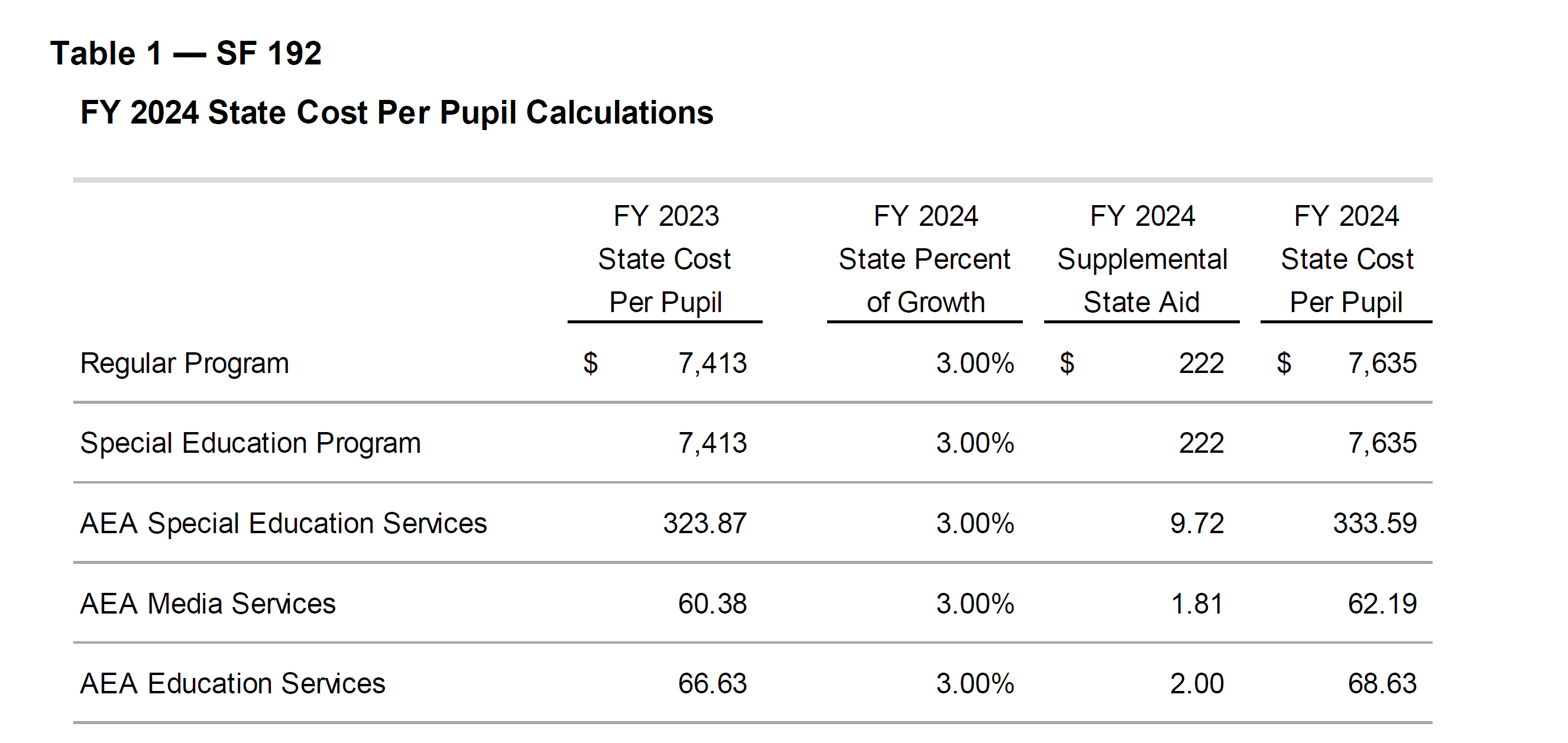
The same process applies to per pupil categoricals, with the dollar amounts from the FY 2024 Supplemental State Aid column added to the district’s (and AEA’s) FY 2023 per pupil amounts. Teacher Leadership and Compensation (TLC) is the only per pupil categorical amount consistent across districts.
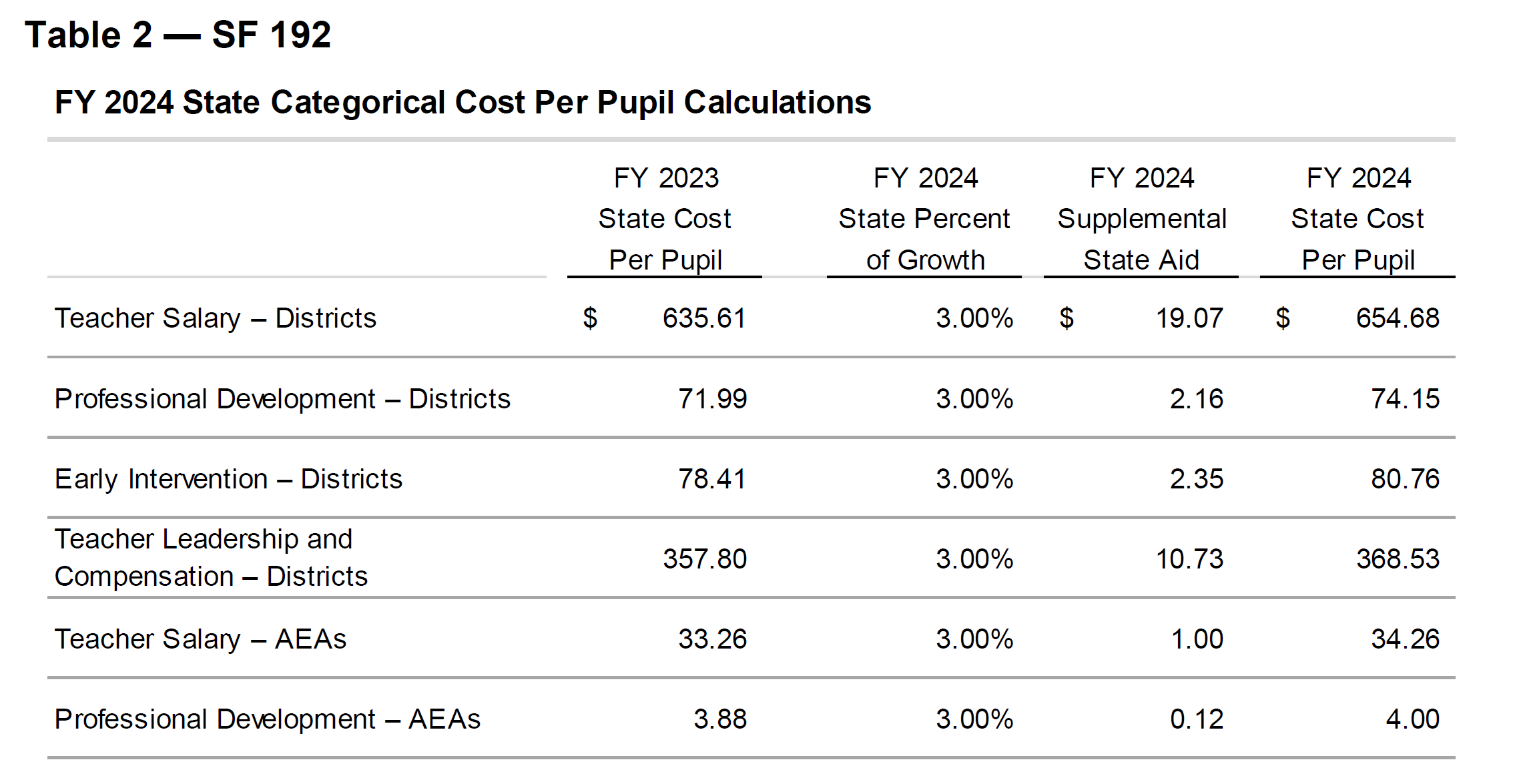
The following table shows the fiscal impact to the state general fund and property taxpayers. Note the $114.3 million increase in state aid, which includes $17.1 million more for AEAs. That is typically removed in the standings appropriations bill at the end of Session. The state amount would then drop to $97.3 million. Additionally, SF 181 Property Tax Error Correction detailed above will change both the state total (increase) and the local property tax total (decrease), but was not yet enacted at the time this fiscal note was written.
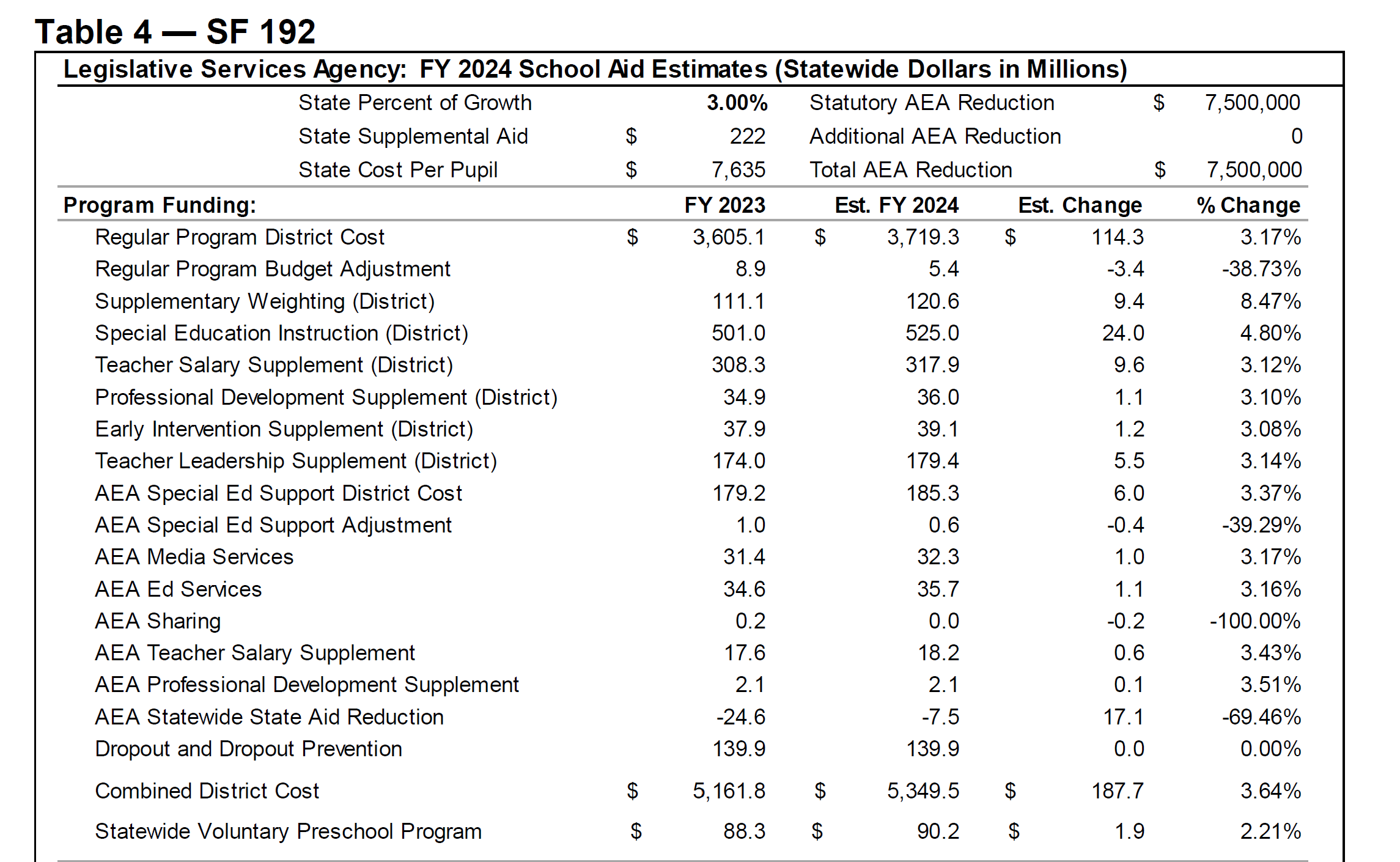
In this next section of Table 4, the Property Tax Relief Payment (PTRP) grows at 15.43% or $15.3 million of the total State Aid amount. Additional excess from the state penny for school infrastructure, also known as SAVE, and the Foundation Base Supplement (FBS) are also property tax relief. Note the total percent change of state vs. local money.
Table 4 Continued:
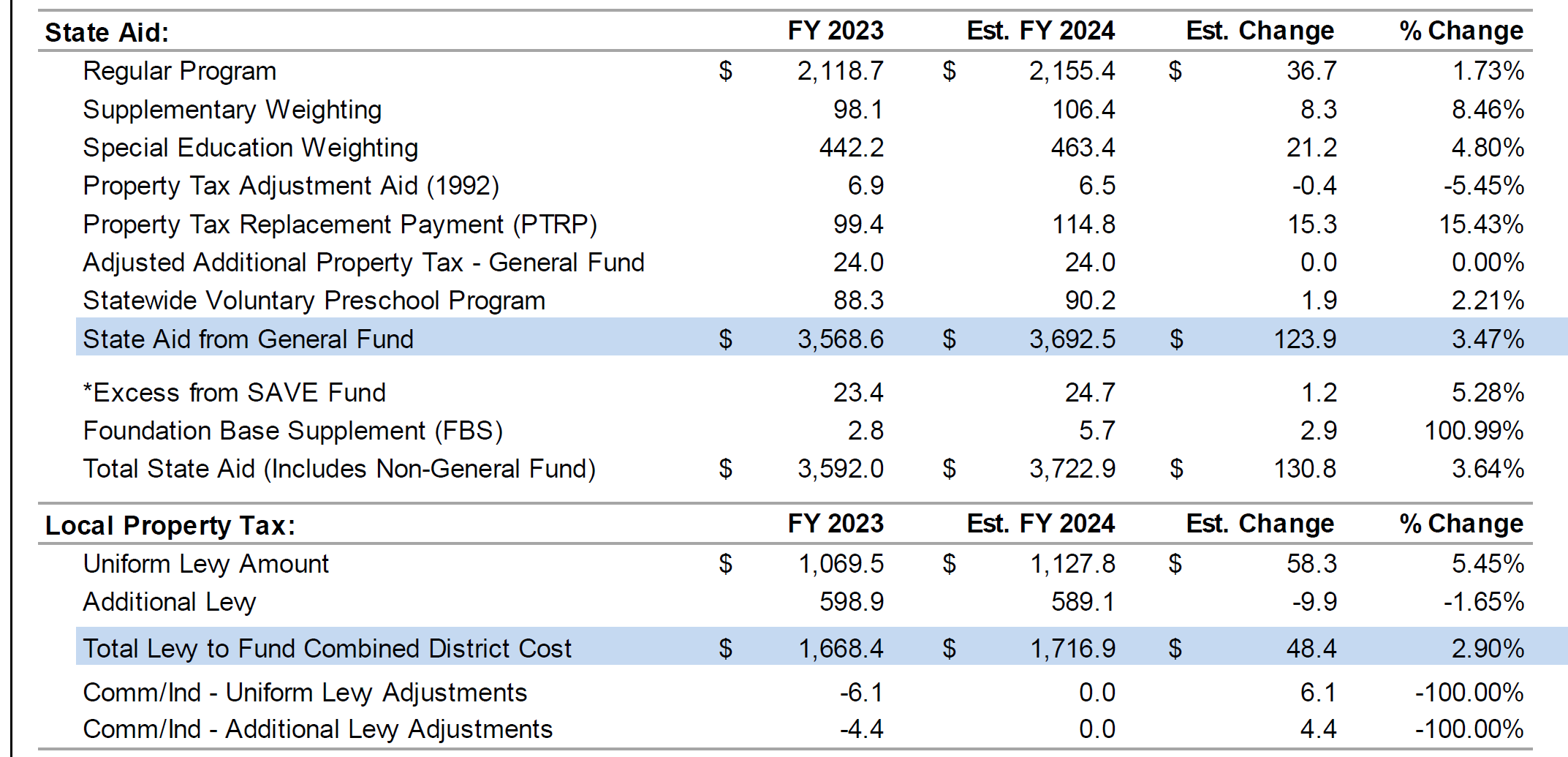
This last section of Table 4 from the Fiscal Note provides additional information: 3% SSA leaves 71 districts on budget guarantee. The Statewide AEA funding is likely overstated due to the timing of this bill, which was enacted before additional reductions were made in the Standing Appropriations bill, SF 578, detailed below. Lastly, the transportation equity fund grows by the SSA rate of 3%.
What is not in this bill? In the last several years, the Senate has insisted on a small amount (either $5 or $10 per pupil) to continue to close the gap in differences between the state cost per pupil and higher district costs per pupil. The current gap is $140 per pupil. There are 224 districts at the state minimum and 103 at a higher DCPP. Additional Transportation Equity funding has also been included by the Senate in years past, with an amount sufficient to reimburse all districts down at least to the state average.
Note: The FY 2024 increase of 3% per pupil is the second highest in 14 years, yet still well below (less than half) of the current year inflation rate.
SF 250 Computer Science Grants: allows recipients of computer science professional development grants to use the money in the fiscal year of the grant through to September 30. Effective on enactment. The Senate passed the bill 50-0, the House approved it 95:0. Signed by the Governor 5/03/2023. UEN registered in support.
SF 318 Office of Apprenticeship: Defines terms and establishes an Iowa Office of Apprenticeship within the Iowa Department of Workforce Development. Sets the purposes of the Office 1) serve as the state registration agency 2) establish labor standards for quality pre-apprenticeships, youth apprenticeships, registered apprenticeships and apprenticeships 3) to establish Rule regarding the registration of the above in the state when the sponsor of such programs chooses to certify or register the programs with the office. 4) to resolve disputes between parties to an apprenticeship agreement. Establishes duties of the Office, creates an Iowa Apprenticeship Council and defines requirements for licensing authorities. Passed by the House 64:33 and the Senate 34:15. Signed by the Governor May 10, 2023. UEN Registered as undecided.
SF 391 Chapter 12 Flexibility: the Senate resisted the House’s changes to require three units of sequential world languages and fine arts and the House’s action to remove PE flexibility from the bill. The Senate accepted the House’s amendment language on CPR, which means that students will still need to obtain a CPR certificate in order to graduate from high school. After all of the changes and compromises, the bill’s final requirements by Division include the following:
Div. I: Eliminates the Comprehensive School Improvement Plan (CSIP).
Div. II: Teacher Librarian and Counselor Flexibility: allows school districts to hire a librarian previously employed as a public librarian, specifies the BOEE shall not require a masters’ degree for a teacher librarian credential, and requires the state BOE to establish by rules, library standards including a collection and updating process. Also defines the counselors Job: “The program shall be designed to ensure that the guidance counselor can work collaboratively with students, teachers, support staff and admins to support the curricular goals of the school by offering responsive services that address the growth and development needs of students and the attainment of student competencies in academic, career and social areas.”
Div. III: Virtual Snow Days: allows up to 5 days or 30 hours of virtual learning in the school calendar.
Div. IV: Educational Standards – Agreements with Community Colleges
- Flexibility for a Community College instructor to teach any unit to meet offer and teach requirements – all courses under 256.11 (5).
- Strikes the requirement in Iowa Code to make a good faith effort to hire a teacher in that content area before allowing the Community College Instructor to teach it.
- Removes the requirement that it only applies to districts below 600 students and is limited to courses with fewer than 5 students participating.
- Specifies that students enrolled in that course do not count for supplementary weighting (concurrent enrollment) if the course is used to meet an offer and teach requirement.
Div. V: Sequential units in one classroom
- Allows an appropriately licensed teacher to teach two or more sequential units of one subject area in the same classroom at the same time in grades 9-12 (including AP if the teacher meets certification requirements). This would allow AP credit, community college credit and high school credit to be offered by the same teacher at the same time.
- Also allows a community college instructor to teach multiple sequential units.
- Requires the district to offer high school credit for the course.
Div. VI: Education Standards:
- Strikes from current standards:
- Technology literacy from 21st Century learning skills.
- Requirement to teach kindergarteners about role of family, sense of self and perception of others.
- AIDS/HIV references throughout.
- Adds to career exploration a duty to facilitate career readiness and introduce students to career opportunities within the local community and across Iowa.
- Requires two sequential units of world languages and two units of fine arts (which may include any of: dance, music theater or visual art). Current law states four units.
- Mandates excusing a high school student from physical education requirements if:
- Student is seeking waiver to enroll in academic courses otherwise not available, or enrolled in a work-based learning program or other educational program authorized by the school which requires the student to leave the school premises for specified periods of time during the school day, or activity sponsored by the school which requires at least as much activity at 1/8th unit per week.
- Removes all of the process for principal in consult with counselor. States student shall be excused if parent requests and the student meets any of the above requirements.
- Does not alter the religious exemption process.
- Changes financial literacy: must offer ½ unit, which MAY be offered and taught through dedicated units of coursework or through units of coursework that also meet the requirements of the coursework required under other offer and teach areas (Science, Social Studies, ELA, Math first 4 units or Math 2 more unit, and CTE). District must still meet all of the financial literacy standards and may meet the requirements through any combination of courses. Strikes the requirement that a student complete a financial literacy course to graduate.
- Senate accepted the House’s amendment on CPR certification, so current law remains and high school students must complete CPR certification to graduate.
This bill was amended and approved by the Senate 34:16. The House concurred, 60:36, sending the bill to the Governor, who has not yet signed it. The bill will be effective on July 1, 2023 if signed by the Governor. UEN registered in support.
SF 482 Use of School Bathrooms by Birth Gender: The bill was effective on enactment, which means when signed by the Governor, on March 22, 2023. The bill does the following:
- Amends Iowa Civil Right Code to state that it is not discriminatory to regulate bathroom use. That may or may not be a factor that a judge would consider if there is a legal challenge, which we expect will happen. The court could grant an injunction prohibiting implementation until a decision is made, but until that happens, the bill is the law of the land.
- Defines “multiple occupancy restroom or changing area” as an area in a school building designed or designated to be used by more than one person at a time, in which students may be in various stages of undress in the presence of other students or persons. Includes but not limited to restroom, locker room, changing room or shower room. Defines “school” means a public school or non-public school. Defines “sex” meaning biological sex as listed on an official birth certificate issued at or near the time of birth. Specifies that a “single occupancy restroom” is for one person at a time.
- Requires schools to designate multiple occupancy restrooms or changing areas only for and used by persons of the same sex. Prohibits a person from entering a multiple occupancy restroom or changing area, or a single occupancy restroom or changing area designated only for persons of the same sex, that does not correspond with the person’s sex.
- Applies to any other school facility, facility used for extra-curricular activity, overnight accommodations, or any other setting where a student may be in various stages of undress in the presence of other students or persons, school personnel shall provide separate, private areas designated for use by students based on the students’ sex.
- Accommodations: students desiring greater privacy, with written parent consent to school officials, may request access to alternative facilities. To the extent reasonable, the school official shall offer options (but cannot include an option for access to a restroom not aligned to sex at birth while students of the opposite sex are present or could be present.)
- The Act includes list of reasonable accommodations: 1) access to a single occupancy restroom or changing area, 2) access to a unisex single-occupancy restroom or changing area by only one student at a time, and 3) controlled use of faculty multiple occupancy restroom or changing area or a single occupancy restroom or changing area.
- Requires the district to adopt policies to accommodate disables persons or young children in need of physical assistance. Permits access for custodial or maintenance purposes when such facility is not occupied by a member of the opposite sex, or for rendering medical assistance, for safety during a natural disaster, emergency or when necessary to prevent a serious threat to student safety.
- Allows Iowa citizens to file a complaint of a school not complying with the law, by providing written notice to the school describing the violation. If the school does not cure the violation within 3 business days, allows the citizen to file the complaint with the Iowa Attorney General. Requires the AG to investigate and allows the AG to initiate legal court action if warranted.
The bill was approved in the Senate 33:16 and the House agreed 57:39. Gov. Reynolds signed it on 3/22/2023. UEN registered opposed to the bill.
SF 496 Transparency and Parents’ Rights: includes the following:
- Prohibits any program, curriculum, test, survey, questionnaire, promotion, or instruction relating to gender identity or sexual orientation to students in K-6. Requires age-appropriate materials (defined below). The language specifically excludes private schools from these requirements.
- Deletes HIV and HPV/Vaccine from K-12 health curriculum (still requires instruction on STDs in grades 7-12). Does not prohibit such instruction but removes it from the requirement that it must be taught.
- Requires districts to have a K-12 library program, consistent with educational standards, with age-appropriate materials, and supporting student achievement goals.
- Districts have until January 1, 2024 before penalties regarding library provisions would kick in. If a DE investigation determines the district or an employee has violated the provision prohibiting content in library books that was not age-appropriate, specifies these consequences:
- First violation results in a written warning to the school board or employee.
- Second and subsequent violation, if DE finds the district knowingly violated the requirements, subjects the Superintendent to a BOEE ethics investigation.
- Second and subsequent violation, if pertains to a licensed employee which knowingly violated the requirements, subjects that employee to BOEE ethics investigation.
- BOEE investigations could lead to disciplinary action.
- Defines “Age-Appropriate” to mean topics, messages, and teaching methods suitable to particular ages or age groups of children and adolescents, based on developing cognitive, emotional, and behavioral capacity typical for the age or age group. “Age-appropriate” does not include any material with descriptions or visual depictions of a sex act as defined in section 702.17. Excludes human growth and development grades 7-12 (sex education classes). Requires research-based content and defines “research-based” according to Iowa Code 279.50, which includes the requirement that information is verified or supported by the weight of research conducted in compliance with accepted scientific methods. . . and is free of racial, ethnic, sexual orientation and gender biases.
- Requires each school board to provide age-appropriate and research-based instruction in human growth and development including instruction regarding self-esteem, stress management, interpersonal relationships, and domestic abuse in grades 1-6.
- Prohibits schools from a formal examination or survey of a student-designed to assess the students’ mental, emotional or physical health that is not required by state or federal law without first getting written parent consent. Requires written notice to parents, at least 7 days prior, to administering an exam or survey required by state or federal law. Requires the notice to include a copy of the survey or link to where the parent can access it. Does not apply to vision or hearing exams and makes exceptions for emergent care situations and for cooperating in a child in need of assistance process.
- Requires schools to publish on the district’s website:
- A detailed explanation of the procedures or policies in effect for the parent of a student enrolled in the school district to request removal of a book, article, outline, handout, video or other education material available to students in the classroom or library. Requires the policy to be prominently displayed on the district’s website.
- A detailed explanation of procedures or policies to request a review of decisions made by the school board, including the petition process for a public hearing.
- Requires school board to adopt a policy describing how parents can review instructional materials used in classrooms. Policy must be on the website and must include the process for a parent to opt their child out of material. Access to the policy must be provided to parents annually in writing or electronically.
- Defines instructional materials as “printed or electronic textbooks and related core materials that are written and published primarily for use in elementary and secondary instruction and required by the state or district for use by students in the student’s classes by the teacher of record.” Excludes lesson plans.
- Requires posting a comprehensive list of books available to students in libraries. If the district does not use an e-catalogue yet, allows a request to the DE for waiver for school years before July 1, 2025.
- Requires identity of a parent requesting removal of materials from the classroom or library shall be confidential.
- Requires charter schools to be subject to these same requirements as public schools districts:
- Restrictions on health screenings and formal examinations or surveys designed to assess a students’ mental, emotional, or physical health.
- Prohibitions related to gender identity.
- Requirements relating to sexual orientation and gender ID instruction.
- Restrictions prohibiting a student from serving on a reconsideration committee.
- Specifies parents’ rights.
- Prohibits the school district from knowingly giving false or misleading information to parents of a student regarding the student’s gender identity. Defines gender identity per IC 216.2, subsection 10. “Gender identity” means a gender-related identity of a person, regardless of the person’s assigned sex at birth.
- If student requests accommodation from a licensed practitioner to affirm gender identity, including use of a name or pronoun different than that on the school district’s registration forms or records, the practitioner must inform an administrator who must inform the parent.
- Specifies the same enforcement mechanism for violation of any of the above that applies to the library and age-appropriate regulations.
- Requires DE to adopt rules to implement this section.
- Protection of student rights; requires parent written consent before requiring a student to take part in any survey, analysis, activity or evaluation that reveals personal information about the student or family and lists all of the personal information to which this applies, including the student’s or family’s political affiliations, mental problems, sexual behavior/orientation/beliefs, illegal, antisocial, self-incriminating or demeaning behavior, critical appraisals of close family relationships, privileged relationships, religion or income. There is an exception for income when needed for eligibility in a program.
- Requires prior written notice to the parent to include detailed information about the survey, including the person who sponsors it, how the information it generates is used, and how such information is stored.
- Requires prior written parent consent for an employee to answer any questions or share student information from the survey (except when developing or implementing an IEP).
- Allows students in homeschool (CPI) to receive special education services without the approval of AEA special education director and allows homeschool parents to request special education services for their children. (Process must still follow chapter 256B and rules for 256B.)
- States that parents have the ultimate responsibility to make decisions affecting their child. Makes exceptions for medical emergencies, child abuse assessment, court orders, and specifies that this law does not allow any illegal activity.
- Exempts this bill from Iowa Code 25B.2 (state unfunded mandate law).
- The Senate kept language from House policy bills:
- Includes the language from HF 429 on an open enrollment request within a district if a student is a victim of bullying or harassment. Allows a parent of a student to enroll their child in another attendance center in the district that offers classes at the student’s grade level, if, as a result of viewing a recording created by a video surveillance system or report from a school district employee, and consistent with the requirements of FERPA, the school district determines that any student enrolled in the district has harassed or bullied the student. Requires the DE to have forms to process such a parent request. Requires the school district to enroll the student in another attendance center unless there is insufficient space. Requires the request is for a period of not less than one year, but allows the parent to return to the original attendance center at any time. Further regulates if the student requires special education, the attendance center must maintain a special education program appropriate to meet the student’s needs and does not cause the size of the class or caseload in the special education program to exceed the maximums established in rules adopted by the state BOE. If the student would be assigned to a general education class, there must be sufficient classroom space. If the student has been suspended or expelled, they must fulfill the terms of their suspension or expulsion, but can then request open enrollment to a new attendance center in the district through this process. The decision of the school district may be appealed to the school board. The transferred student is immediately eligible to participate in varsity athletic contests. States that this policy does not prohibit transfer to another attendance center in the district pursuant to a policy adopted by the school board allowing transfer for reasons in addition to this action. Requires the state BOE to adopt rules to administer this section.
- Allows a school district, following their anti-bullying/harassment policy, to notify parents in writing or by email within 24 hours after an employee witnesses, either directly or from viewing a recording from a video surveillance system, any student enrolled in the district harassing or bullying the student. Requires charter schools to have such a policy.
- Requires charter schools to have an anti-bullying anti-harassment policy and procedure.
- These provisions on inter-district transfer open enrollment requests are effective on enactment. The State Board of Education is required to implement rules, which typically take about 180 days.
The Senate removed most of the education policy bill language that the House had amended on to this bill, shortening the legislation from 38 to 18 pages. The Senate approved the bill as amended, 34:16, on party lines. The House voted to concur, 57-38, with a few Republicans joining the Democrats in opposition. The bill is awaiting signature by the Governor. UEN Registered opposed to the bill.
Note: Along the way, this bill was improved measurably. Many in the public education lobby advocated strongly to remove a graduation requirement for a high-stakes civics test. Advocates also shared concerns about the costs of a searchable database of all instructional classroom materials. The original bill required lists of all contractors or others with whom students might be in contact be published on the district’s website. Many other provisions were eliminated or improved. We appreciate the strides made in the House and Senate to come up with something that is clearly understood and possible to implement.
SF 514 State Government Reorganization: this bill consolidated much of the executive branch into fewer units of governance. The bill was approved in the Senate 34:15. The House agreed 58:39. The Governor signed it on 4/04/2023. UEN registered as undecided on the bill. Makes the following transfers of interest to school leaders:
|
Function/Division/Board |
Former Location |
New Location |
|
Early Childhood Iowa |
Department of Human Services |
Department of Health and Human Services (HHS) |
|
Library Services/State Librarian |
Department of Education (DE) |
Department of Administrative Services (DAS) |
|
Workers’ Compensation Division |
Department of Labor |
Department of Inspections, Appeals and Licensing (DIAL) |
|
Fire Control Licensing and Building Code Regulation |
Department of Public Safety (DPS) and State Mire Marshall |
DIAL |
|
School Infrastructure Fund $$ and Structure Evaluation |
State Fire Marshall |
DIAL |
|
Administrative Law Judges (DE, special ed, BOEE and others) |
|
DIAL |
|
Management of state’s interest in arts, history & cultural matters |
Department of Cultural Affairs |
Iowa Economic Development Authority |
|
Statewide Work-based Learning Intermediary Network Program |
DE |
Iowa Department of Workforce Development (IWD) |
|
Vocational Rehabilitation |
DE |
IWD |
|
Apprenticeship Training Program |
DE |
IWD |
|
Future Ready Iowa |
IDEA |
IWD |
|
Adult Ed/Literacy Programs |
DE |
IWD |
|
STEM Initiative |
University of Northern Iowa |
NEW - Innovation Division DE: STEM |
|
Community Colleges, Postsecondary Readiness, CTE/Perkins, College Student Aid Commission, BOEE |
DE |
NEW – Higher Education Division and Higher Ed Division Administrator |
Education and Standings Appropriations Bills:
SF 560 Education Appropriations: the line-item appropriations in this bill are mostly status quo appropriations equaling the FY 2023 level but for a few differences. The overall package increase was 2.65%. Community Colleges received 3.25% increase. Notable items include:
- I-JAG (Iowa Jobs for America’s Graduates): $9.1 million, which is an increase of $1 million for the IJAG program (12% increase over last year.)
- No increase for Therapeutic Classrooms or Mental Health services/training through AEAs or for early childhood programs.
- Eliminates $852,000 for nonpublic school textbooks
- Repeals the existing online job posting system (Teach Iowa IC 256.27) and requires Workforce Development, in consult with DE, to create an internet site for posting jobs openings. Requires DE, school districts, charter schools and AEAs to submit all job openings to the site. Allows accredited nonpublic schools to submit job openings to post.
- DE is to convene a task force to study funding for At-Risk students and DoP. Must Consider:
- how schools currently use state funding for programs for at-risk and DoP (note: DoP is locally funded not state funded, while At-Risk funding is through the formula)
- the effectiveness of such programs
- whether and to what extent state funds should be reallocated to Jobs for America's Graduates (iJAG),
- how to best utilize state funding for at-risk and DoP programs.
- Report of the task force is due to the General Assembly by Dec. 31, 2023.
The bill was approved in the Senate, 34:16. The House passed it 59:33. It’s awaiting the Governor’s signature. UEN is registered as undecided.
SF 578 Standing Appropriations: makes changes to appropriations that would otherwise stand as previously enacted. The following provisions impact schools:
- Limits the FY 2024 General Fund appropriation to the DE for nonpublic school transportation to $9.0 million. Requires the appropriation to be prorated if the claims exceed the appropriation.
- Suspends the General Fund FY24 standing appropriation of $14.8 million to DE for the Instructional Support Program. (the State has contributed no state funding to ISL since 2011.)
- Reduces the FY 2024 State school aid funding to AEAs by $22.1 million. (There is an additional $7.5 million statutory cut, so total is $29.6 million, which cuts $5 million deeper than in FY 2023).
- Does not mention the $10 million high needs schools grant. If this stands, this would be the first time since the 2013 Education Reform Act first created this appropriation that it is funded.
The bill was approved by the Senate 31:16. The House approved it 55:38, sending it to the Governor. UEN registered opposed to the division cutting the AEAs.
Contact us with any questions, feedback or suggestions to better prepare your advocacy work:
Margaret Buckton, UEN Executive Director/Legislative Analyst
margaret@iowaschoolfinance.com
515.201.3755 Cell


